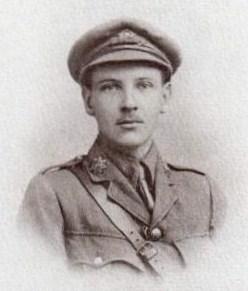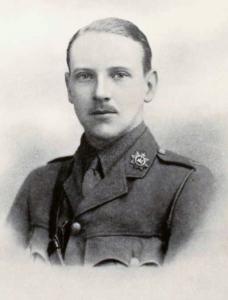
|

|
| 2nd Lieutenant Gerald Howard EARDLEY-WILMOT | |
|
9th (Service) Battalion Devonshire Regiment and 20th Machine Gun Company, Machine Gun Corps Date of birth: 14th March 1890 Date of death: 10th March 1916 Died of wounds aged 25 Buried at Corbie Communal Cemetery Plot I Row E Grave 11 |

|
| Gerald Howard Eardley-Wilmot was born at Lewisham on the 14th of March 1890 the fifth and youngest son of Lieutenant Francis Eardley-Wilmot RN and Lucy Mary Emily (nee Prynne) Eardley-Wilmot of Winthorpe House, Shaldon, Teignmouth in Devon. He was educated at Southey Hall in Worthing from 1897 to July 1904 and at Lancing College where he won an Exhibition and was in News House from September 1904 to April 1908. He won a number of school prizes for mathematics and was a member of the Officer Training Corps where he served as a Drummer. He won the 2nd Prize for proficiency with the side drum in the Public Schools Competition. On leaving school he was apprenticed as a pupil to the Brush Electrical Engineering Company Ltd at Loughborough in May 1908 and worked at their Falcon Works where he passed through all departments of the company. On the completion of his two year apprenticeship, he worked for them for a further year. During this time, he spent a year at Sheerness where he was involved in the installation of electrical plant for the Sheerness and District Electric Power and Traction Company Ltd. At the conclusion of his apprenticeship he was awarded a certificate by the Brush Company and entered their service as an estimating engineer in June 1911. He continued working for them, with a break between August and December 1911 when he was employed as a commercial representative of Messrs. Pemberton, Wooler & Company of Leeds, until the summer of 1912. He left them in to join the firm of Messrs. Brown, Bouverie and Company of Westminster as an assistant electrical engineer in the contracts department. He spent some time at the company’s power station at Plymouth. In the autumn of 1912 he enrolled as a student at the South Western Polytechnic at Chelsea and attended evening course in alternating and polyphase current machinery. At the same time, he attended courses in applied mechanics at Battersea Polytechnic, during which time he wrote a series of articles on technical matters in the “Electrician” magazine. Following the outbreak of war, he resigned from his job and applied for a commission in the army on the 20th of August 1914, in an application which was supported by the Reverend H.F. Westlake, Head of Mathematics at Lancing. He attended a medical examination at Exeter on the 9th of November and was commissioned as a 2nd Lieutenant in the 9th Battalion Devonshire Regiment on the 27th of November 1914. He then went on to the Military School at Camberley, which had been established for the training of new officers, after which he joined his battalion at Aldershot. When the battalion went to France he was kept at Aldershot but soon received orders to proceed overseas. He landed in France on the 1st of October 1915 as one of a draft of 300 officers and men sent out to replace the crippling losses the 9th Battalion had suffered at Loos the previous month. He joined his battalion in the field on the 5th of October while the battalion was in trenches at Cambrin. The group waited at Le Preol until the battalion came out of the line when they were inspected by the Adjutant there on the 9th of October. On the 15th of December 1915 he attended the He attended the Machine Gun School at Bailleul for instruction, re-joining his battalion on the 8th of January 1916 and from the 16th to the 28th of January he went home to the UK on leave. He re-joined his battalion in the field on the 30th of January. The 20th Machine Gun Company of 20th Brigade was formed on the 10th of February 1916 and he transferred to the new unit on the same day. On the 10th of March 1916 the 20th Machine Gun Company was in support of its Brigade in trenches opposite the village of Fricourt. At 3pm Gerald Eardley-Wilmot was struck on the left side of his chest by shrapnel from a rifle grenade and was badly wounded. He was evacuated some twelve miles to the rear to 5 Casualty Clearing Station at Corbie where he died of his wounds later that day. His Brigade Chaplain wrote: - "I deeply regret to tell you that your son Gerald was very badly hit in the trenches this afternoon. I think it was a rifle grenade, though some men say it was a shell. I was quite near to him at the time, and I went up to him at once. The doctor arrived on the spot very shortly afterwards and dressed him and gave him morphia. He had a nasty wound in his left breast, and I am afraid his lung must have been hit. I travelled with him to the Field Ambulance, where the doctor was not very hopeful as to his recovery. From here he was sent on to the Casualty Clearing Station, where he will get a comfortable bed and be operated on if necessary. He was very quiet, and suffered little pain after the morphia. He did not fear the prospect of death in the least, and I have no doubt the padre at the Clearing Station will give him the Communion. He asked me to write to you, which of course, I promised to do. I think he felt he was dying as he turned to me and said "Padre, I am going; goodbye." I only knew your boy slightly, but to know him was to love him and I cannot tell you how deeply I felt for you and him in all the four hours I was with him after he was hit. His C.O. told me that he was the keenest officer he had got, and he was quite fearless. I do hope he will pull through; but if he doesn't, I can assure you that he was the kind of boy who didn't fear death because he had no need to." His father received the following telegram dated the 12th of March 1916: - "Deeply regret to inform you that Lt G.H. Eardley-Wilmot 9th Devon Regt died of wounds 10th March. Lord Kitchener expresses his sympathy." His Colonel wrote: - "It is with the very deepest regret I have to inform you that your son died of his wounds yesterday evening in the 5th Casualty Clearing Station at Corbie, and will be buried there tomorrow. As the battalion is in the trenches, only Prynne can be spared to attend. As I said yesterday, his loss is a very great one to both the battalion and to the Machine Gun Company. He was always so very keen and did his work so well. Will you please accept, on behalf of the battalion and myself, our most sincere sympathy with you in your great loss." His Company Commander wrote: - "Just a line to send you my sincerest sympathy. I was very sorry to hear that your son had died from the wound he received. He joined the Company on the 10th of last month, and during the short time I knew him I formed a very high opinion of your son. He was a splendid officer, always cheerful, and was very popular in his Company." |
|
 | |
| News House |
Back